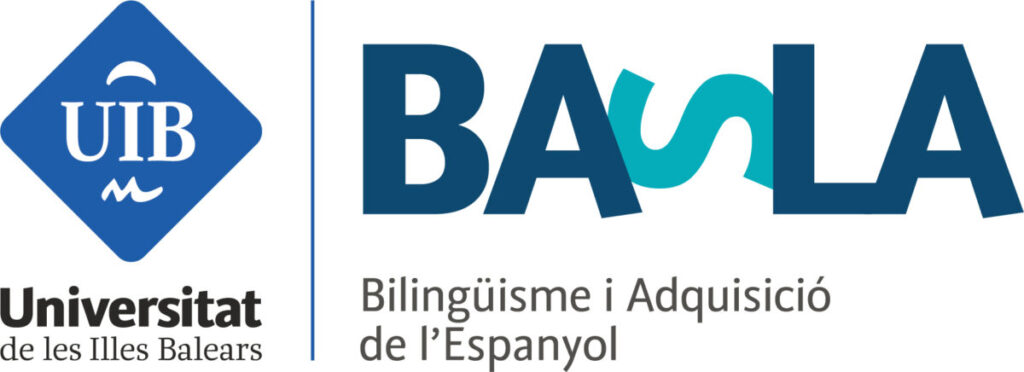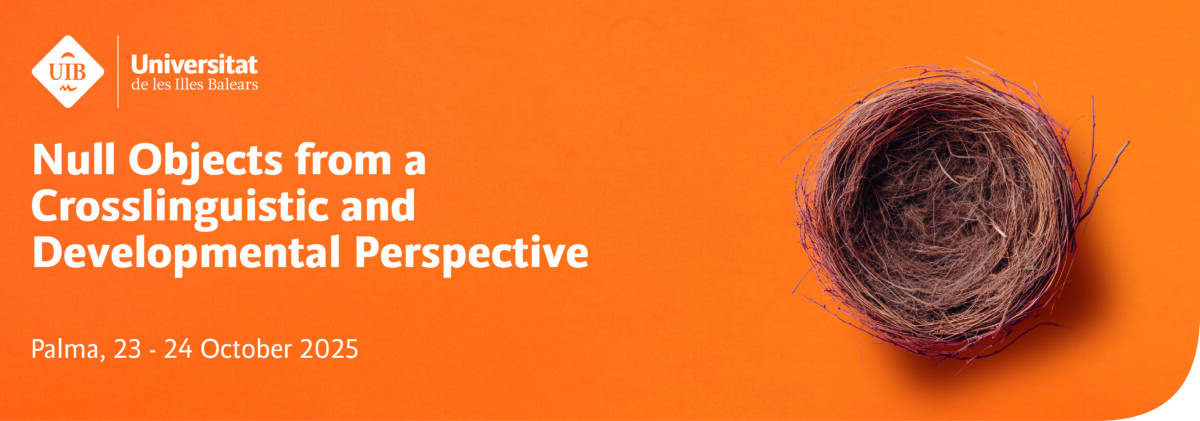Null Objects from a Crosslinguistic and Developmental Perspective 2025 will be hosted by the Universitat de les Illes Balears and will take place in Palma de Mallorca (Spain). It is the third edition, following conferences at University of Minho (2021) and at Goethe University, Frankfurt (2023).
Null Objects from a Crosslinguistic and Developmental Perspective It aims to gather colleagues to present and discuss new empirical and theoretical insights on null objects from a crosslinguistic and developmental perspective.
Invited speakers
Maia Duguine (CNRS-IKER)
Ianthi Tsimpli (University of Cambridge)
While null subjects have been extensively studied cross-linguistically, null objects have received considerably less attention. Different languages impose varying restrictions on object omission, which can be syntactic, semantic, lexical, or pragmatic. Unspecified object drop is widely attested, whereas omission of definite or anaphoric objects is much more restricted. However, it can still be found in typologically diverse languages, ranging from Asian radical pro-drop languages to languages like Portuguese and Finnish, which have agreement inflection but lack object agreement. Additionally, from a developmental perspective, there is an optionality period in the realization of objects during the early stages of language acquisition, even in languages with very restricted object drop. An effective theory of omitted arguments must identify the factors that restrict or favor object omission in a given language and explain the conditions that affect the requirement or optionality of object clitics.
Abstract submission
We invite abstract submissions for 20-minute talks (+10 min discussion) or posters of original, unpublished work. Abstract submissions to this workshop may focus on one or more of the following issues, among others:
– Which syntactic, semantic, and discourse-pragmatic factors determine the identification and interpretation of null objects?
– When are null objects optional or obligatory?
– Are empty categories with pronominal (pro) features involved in the case of null objects?
– Could there be a unified analysis of null objects cross-linguistically?
– Are null subjects and null objects typologically correlated?
– What insights does a developmental perspective on null objects offer? And a diachronic one?
The language of the conference will be English.
Submission guidelines
Prospective authors are invited to submit abstracts for an oral or poster presentation. Abstracts should be in English and anonymous. They should not exceed one page (A4 or letter size paper, 2.5cm or 1-inch margins on all sides, 12-point font), with one additional page for examples, tables, figures and references. The abstracts must be uploaded as PDF attachments through OpenReview. Submissions are limited to one individual and one joint abstract per author, or two joint abstracts per author. Upon submission, please indicate whether your work should be considered for an oral presentation or for a poster (or both).
Publication
All authors who present their work at the conference will be invited to submit their paper for publication. The outcome of NOCroDeP2025 will be a collective book published by a high standing international publisher in the field. Papers for publication will be selected based on their contribution to specific themes of particular interest arising from the conference through a blind peer-review process.
Registration is now open!
Registration fees
Early bird (from May 20 to July 1st):
– Faculty: €180
– Students: €100
Regular (from July 2 to October 1st)
– Faculty: €230
– Students: €150
Fees include attendance to all the conference sessions, certificate of presentation (for speakers), certificate of attendance (for non-speakers and speakers), conference documentation, coffee breaks and reception on October 23, 2025.
Registration Deadline for authors
Registration deadline for authors is July 1, 2025. In case the registration is not done by July 1, the oral presentation or poster will not be included in the final conference program.
Cancellation and refund policy
Cancellation deadline is September 8, 2025. After that day, registration fees will not be refunded.
Thursday, October 23
Friday, October 24
Scientific committee
Pilar Barbosa (Universidade do Minho)
Sonia Cyrino (Universidade Estadual de Campinas)
Maia Duguine (CNRS IKER)
Cristina Flores (Universidade do Minho)
Nelli Kerezova (Goethe Universität Frankfurt)
Maria Lobo (Universidade Nova de Lisboa)
Ana Madeira (Universidade Nova de Lisboa)
Carlos Martínez García (Universidad Complutense de Madrid)
Gabriel Martínez Vera (Newcastle University)
Acrisio Pires (University of Michigan)
Esther Rinke (Goethe Universität Frankfurt)
Liliana Sánchez (University of Illinois Chicago)
Scott Schwenter (The Ohio State University)
Ianthi Tsimply (University of Cambridge)
Organizing committee
Pedro Guijarro Fuentes (chair)
Melania S. Masià (chair)
Maria del Mar Bassa Vanrell
Iria Bello Viruega
Estela Garcia Alcaraz
Conference venue
Null Objects from a Crosslinguistic and Developmental Perspective 2025 will take place at the Sa Riera building of the Universitat de les Illes Balears. The building is located in the city center, at Miquel dels Sants Oliver, 2.
Accommodation
Hotels recommended by the organization:
Important dates
Deadline for abstract submission: March 3, 2025
New deadline for abstract submission: March 31, 2025
Notification of acceptance: June 12, 2025
Registration opening: May 20, 2025
Registration deadline for authors: July 1, 2025
Provisional program: July 23, 2025
Conference dates: October 23-24, 2025

